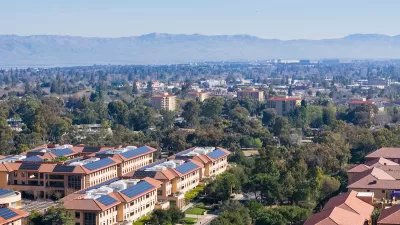More analysis and more equity will be required for Palo Alto to finally adopt a Housing Element that complies with state laws.

For a second time, the California Department of Housing and Community Development (HCD) has rejected a Housing Element from the city of Palo Alto in accordance with the Regional Housing Needs Assessment process. The city adopted the most recent Housing Element in May and had already begun the process of revamping its zoning code to meet its goals for 6,000 new housing units in the next eight years.
According to an article by Gennady Sheyner for the Palo Alto Weekly, the Housing Element rejected by the HCD calls for “raising the allowed density in multi-family zones and encouraging residential construction in historically commercial areas in the southeast portion for the city, around San Antonio Road and Fabian Way.” The Housing Element also expands the city’s new Housing Incentive Program (HIP), “which grants density and height bonuses, as well as other zoning breaks, to housing developers,” according to Sheyner.
“The letter from the HCD does not take issue with any of these proposed programs and concurs that the HIP is a great tool for housing developments,” report Sheyner. “The agency also found, however, that the city has not done enough to prove that the non-vacant sites on the city’s adopted housing inventory are actually suitable for housing.”
“The HCD also found that the city has not sufficiently analyzed some of the existing commercial zones for potential addition of residential use,” adds Sheyner.
The HCD first rejected Palo Alto’s Housing Element in March, before the city adopted its revised Housing Element in May. The city has until Jan. 31 to complete a compliant Housing Element. Until them, the city is subject to “Builder’s Remedy” proposals that are not subject to the boundaries set by local zoning laws. According to Sheyner, the city already has four such proposals in the pipeline.
FULL STORY: State again rejects Palo Alto's housing plan

Study: Maui’s Plan to Convert Vacation Rentals to Long-Term Housing Could Cause Nearly $1 Billion Economic Loss
The plan would reduce visitor accommodation by 25,% resulting in 1,900 jobs lost.

North Texas Transit Leaders Tout Benefits of TOD for Growing Region
At a summit focused on transit-oriented development, policymakers discussed how North Texas’ expanded light rail system can serve as a tool for economic growth.

Using Old Oil and Gas Wells for Green Energy Storage
Penn State researchers have found that repurposing abandoned oil and gas wells for geothermal-assisted compressed-air energy storage can boost efficiency, reduce environmental risks, and support clean energy and job transitions.

Private Donations Propel Early Restoration of Palisades Playground
Los Angeles has secured over $1.3 million in private funding to restore the Pacific Palisades playground months ahead of schedule, creating a modern, accessible space that supports community healing after recent wildfires.

From Blight to Benefit: Early Results From California’s Equitable Cleanup Program
The Equitable Community Revitalization Grant (ECRG) program is reshaping brownfield redevelopment by prioritizing projects in low-income and environmental justice communities, emphasizing equity, transparency, and community benefits.

Planting Relief: Tackling Las Vegas Heat One Tree at a Time
Nevada Plants, a Las Vegas-based nonprofit, is combating the city’s extreme urban heat by giving away trees to residents in underserved neighborhoods, promoting shade, sustainability, and community health.
Urban Design for Planners 1: Software Tools
This six-course series explores essential urban design concepts using open source software and equips planners with the tools they need to participate fully in the urban design process.
Planning for Universal Design
Learn the tools for implementing Universal Design in planning regulations.
Ascent Environmental
Borough of Carlisle
Institute for Housing and Urban Development Studies (IHS)
City of Grandview
Harvard GSD Executive Education
Toledo-Lucas County Plan Commissions
Salt Lake City
NYU Wagner Graduate School of Public Service




























